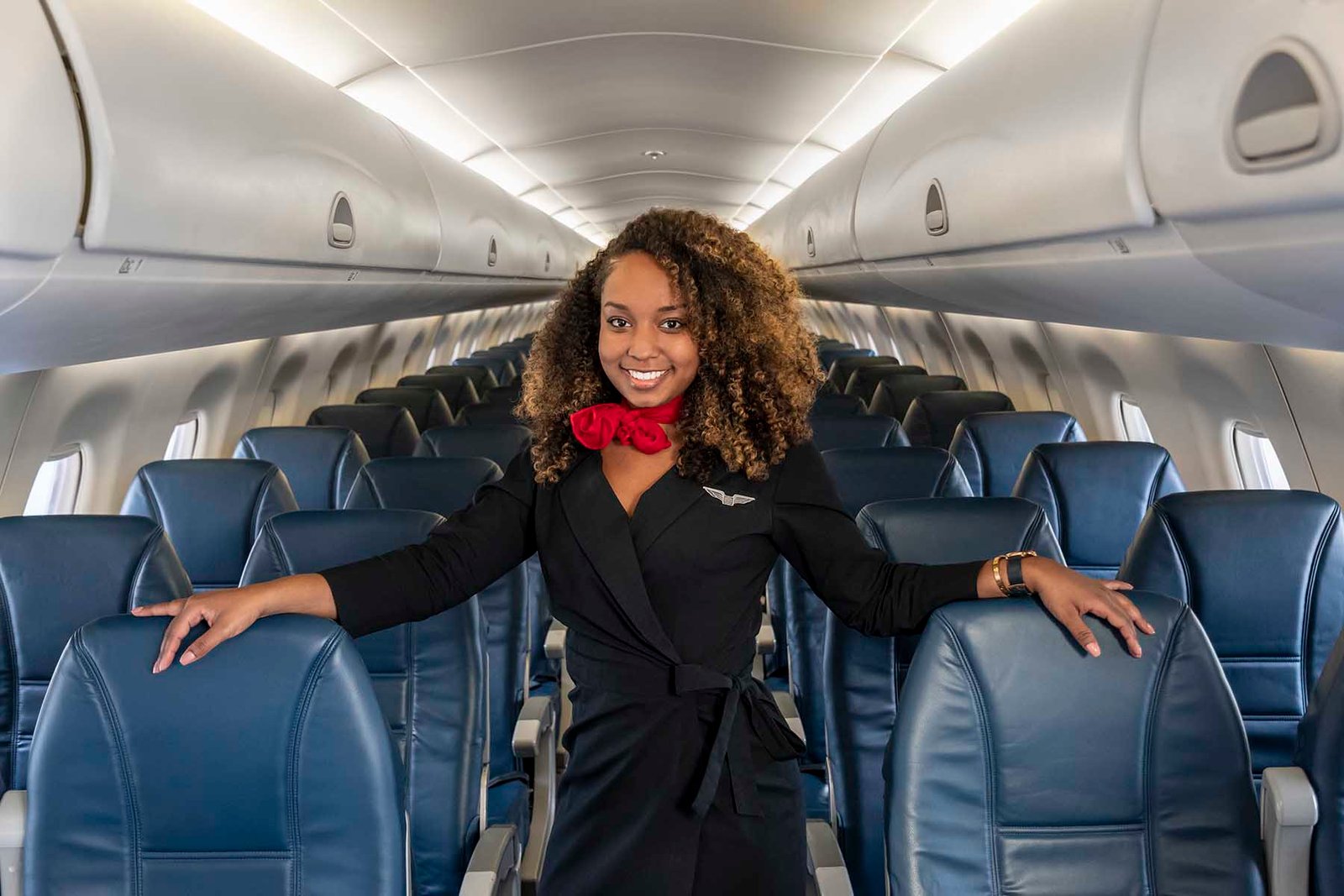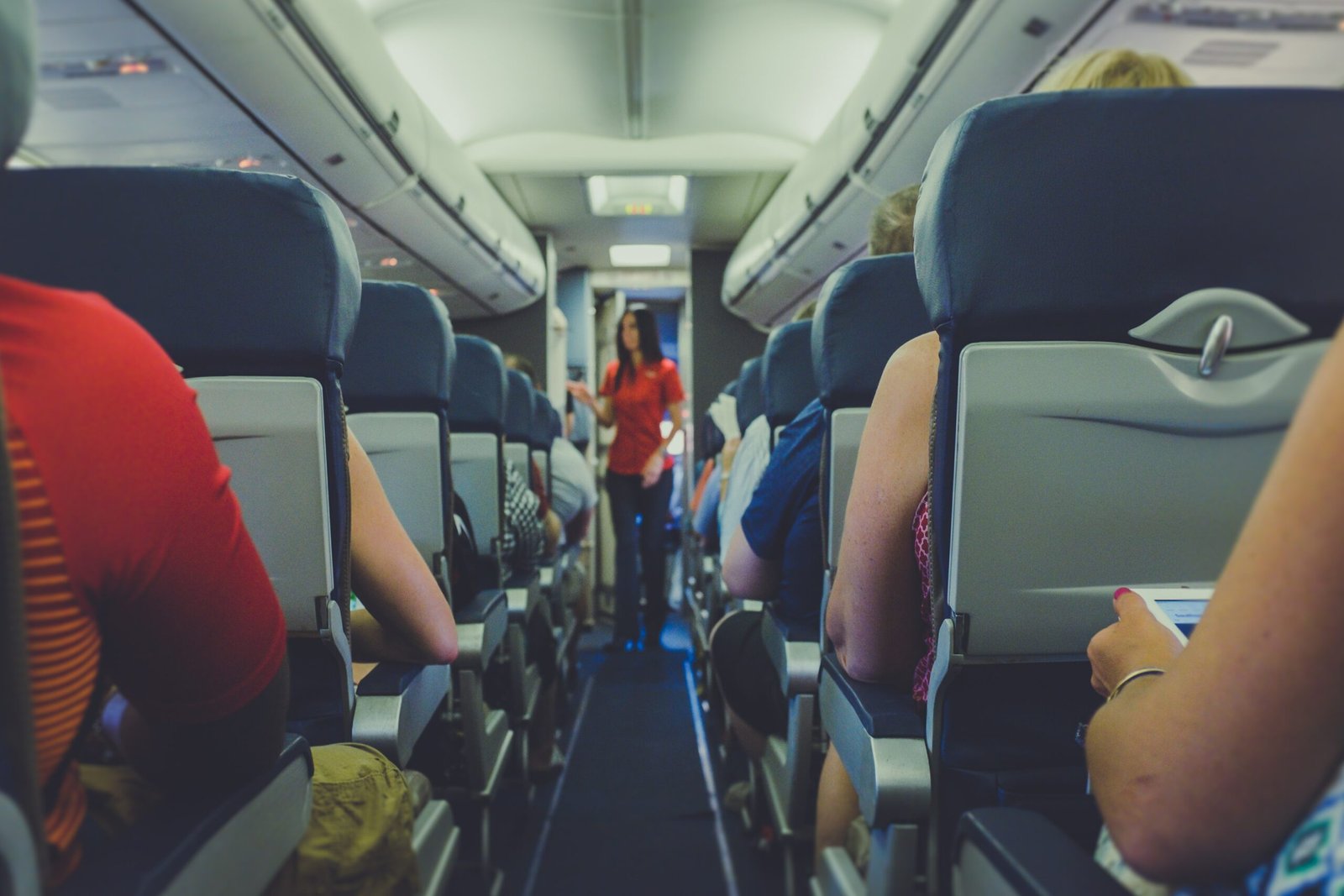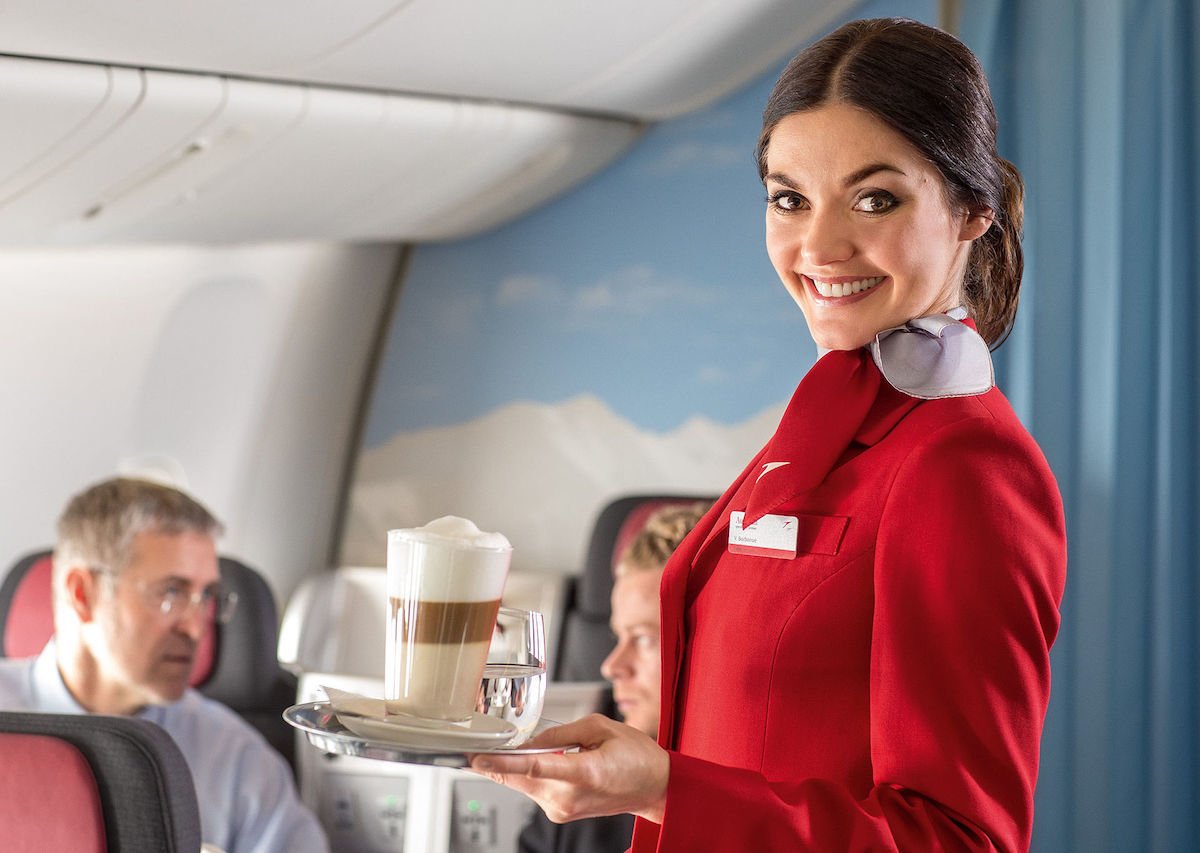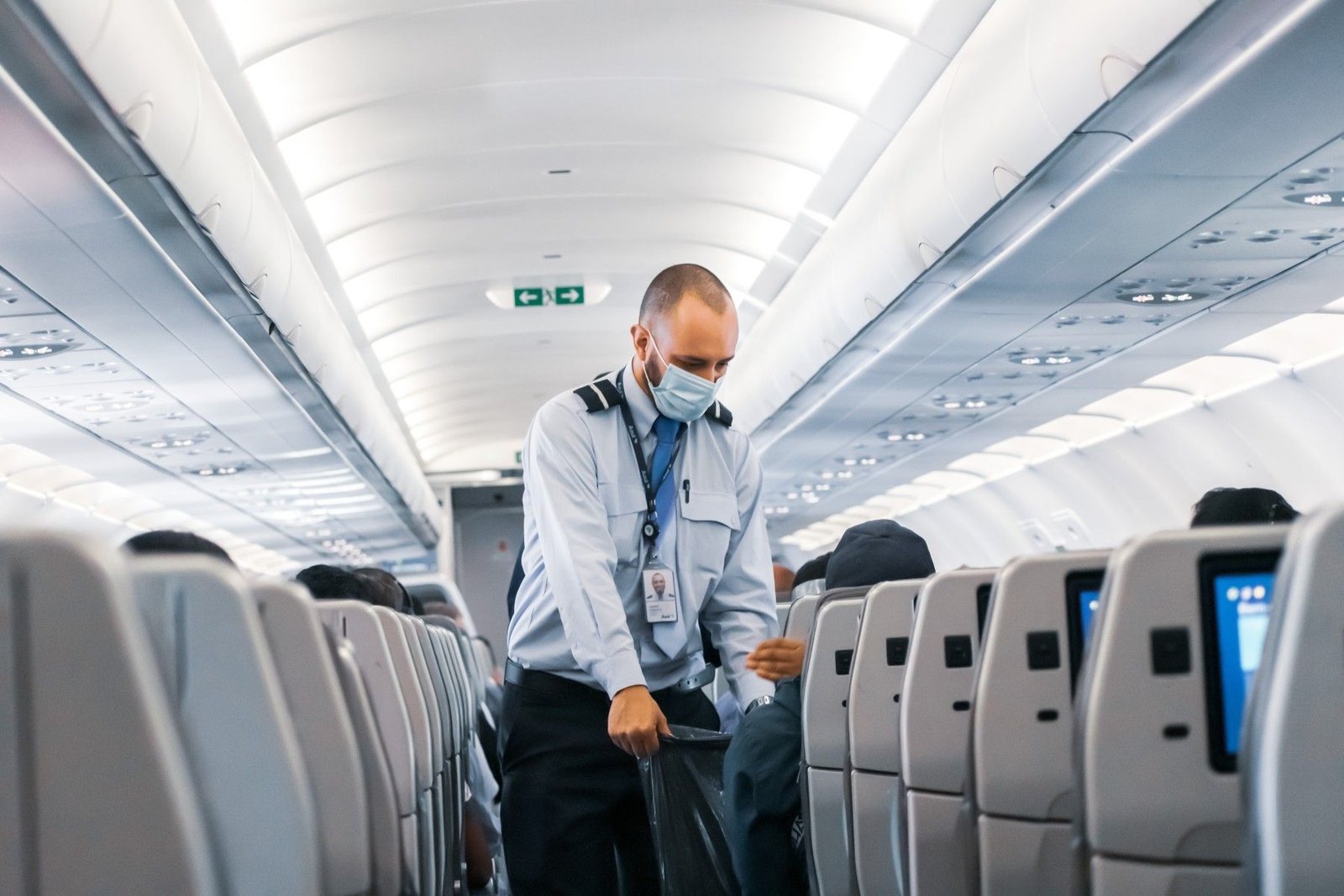Are you a student with dreams of taking to the skies as a flight attendant in the United States? Look no further, as this article will provide you with a brief introduction to the exciting opportunities that await you in this career. With a focus on students who are considering a career in the USA, we will explore the various aspects of being a flight attendant, including the career overview and the potential benefits that come with it. So, fasten your seatbelt and get ready to embark on a journey into the world of flight attendants in the USA.

This image is property of cdn-static.findly.com.
Requirements for a Flight Attendant Career
Minimum age
To pursue a career as a flight attendant in the United States, the minimum age requirement is usually 18 or 21 years old, depending on the airline. This requirement ensures that individuals have reached a level of maturity and responsibility necessary for the role. However, some airlines may have specific age requirements to meet their standards and operational needs.
Height and weight restrictions
Flight attendants must meet specific height and weight requirements due to the nature of the job. These restrictions are primarily in place for safety reasons, as flight attendants need to be able to reach overhead compartments, maneuver through tight spaces, and assist passengers during emergencies. The height requirements usually range between 5’0″ to 6’3″, and weight must be proportionate to height.
Education and experience requirements
While a high school diploma or GED is the minimum educational requirement for most airlines, having further education such as a college degree can be beneficial. Airlines often prioritize candidates with excellent communication, customer service, and problem-solving skills. Prior experience in customer service or hospitality industries can also give candidates an advantage during the hiring process.
Training and Certification Process
Flight attendant training programs
Once hired, aspiring flight attendants undergo comprehensive training programs provided by their respective airlines. These programs cover various topics such as safety procedures, emergency protocols, first aid, on-board service, and cultural sensitivity. Training typically involves hands-on simulations, classroom instruction, and exams to assess knowledge and skills.
Certification and licensing requirements
Upon successful completion of the training program, flight attendants must obtain certification from the Federal Aviation Administration (FAA) to become qualified cabin crew members. This certification involves passing written exams and demonstrating proficiency in safety and emergency procedures. Additionally, flight attendants must also undergo annual recurrent training to maintain their qualifications.

Job Responsibilities of a Flight Attendant
Pre-flight duties
Before each flight, flight attendants are responsible for conducting pre-flight inspections to ensure the aircraft is clean, well-stocked, and in compliance with safety regulations. They also attend pre-flight briefings where they receive important information about the flight, such as passenger demographics, special requests, and safety updates. Pre-flight duties may also involve assisting in boarding procedures and handling any necessary paperwork.
In-flight duties
During the flight, flight attendants play a crucial role in ensuring passenger safety and comfort. They perform safety demonstrations, enforce safety regulations, and handle emergency situations, if they arise. Additionally, flight attendants provide passenger assistance, such as serving meals and beverages, addressing inquiries, and accommodating special needs.
Post-flight duties
After the flight, flight attendants carry out post-flight duties that include cleaning the cabin, restocking supplies, and completing any necessary documentation. They may also participate in debriefings to discuss any significant events or concerns during the flight. Flight attendants often use this time to rest and prepare for their next assignment.
Working Conditions and Schedule
Shift work and irregular schedules
As a flight attendant, you can expect to work irregular hours and be assigned to various shift rotations, including weekends and holidays. Airlines operate around the clock, requiring flight attendants to be available for early morning, late-night, and overnight flights. The nature of the job demands flexibility and adaptability to changing schedules.
Working in a team environment
Flight attendants work closely with a diverse team of colleagues, including pilots, other flight attendants, and ground crew members. Effective communication and teamwork are essential to ensure a smooth and safe flight operation. Collaborating with fellow cabin crew members becomes crucial during emergencies when they must coordinate actions to provide the necessary assistance to passengers.
Dealing with challenging passengers and emergencies
Flight attendants occasionally encounter challenging situations involving disruptive or unruly passengers. De-escalation techniques and conflict resolution skills are vital to maintaining a calm and secure cabin environment. Moreover, flight attendants are trained to handle various emergencies, such as medical incidents, turbulence, and evacuations, ensuring the safety and well-being of all passengers on board.

This image is property of cdn1.matadornetwork.com.
Benefits and Perks of a Flight Attendant Career
Travel benefits
One of the significant perks of being a flight attendant is the opportunity to travel. In addition to visiting various destinations around the world, flight attendants often enjoy discounted or free flights for personal travel. This benefit allows them to explore new places and cultures, making their career a rewarding experience in terms of personal growth and enrichment.
Healthcare and retirement plans
Many airlines provide flight attendants with comprehensive healthcare benefits, including medical, dental, and vision insurance. Retirement plans, such as 401(k) or pension programs, are also commonly offered, allowing flight attendants to save for their future. These benefits contribute to the financial security and wellness of individuals pursuing a career in this field.
Job stability and growth opportunities
The airline industry is known for its stability, and flight attendants enjoy job security once they have established themselves in their careers. Furthermore, as airlines expand and new routes are added, there are ample opportunities for growth and career advancement. Flight attendants can work their way up through the ranks to become senior crew members or pursue specialized roles within the airline.
Salary and Earning Potential
Average salary of flight attendants
Flight attendants’ salaries can vary based on factors such as the airline’s size, location, and years of experience. According to the Bureau of Labor Statistics, the median annual wage for flight attendants in 2020 was $56,640. It is important to note that entry-level positions often have a lower salary compared to more experienced flight attendants.
Factors affecting salary
Several factors can influence a flight attendant’s earning potential. These factors include seniority within the company, flight hours, the length of flights served, and the airline’s collective bargaining agreements. Additionally, some airlines offer additional pay for overseas flights or have incentives for exceptional performance.
Opportunities for additional income
Flight attendants may have avenues for additional income through various means, such as working overtime, taking on international flights, or participating in product or service promotions onboard. Additionally, some flight attendants may choose to pursue other opportunities, such as public speaking engagements or writing books, utilizing their unique experiences and knowledge gained from their careers.

This image is property of s3-us-west-2.amazonaws.com.
Career Advancement Opportunities
Seniority-based promotions
In the airline industry, seniority plays a crucial role in career advancement. As flight attendants gain more experience and accumulate flight hours, they can progress to more senior positions. Seniority allows flight attendants to have priority in scheduling preferences, higher pay rates, and even the opportunity to be promoted to cabin manager or other leadership roles.
Specialized roles within airlines
Flight attendants can also pursue specialized roles within airlines, such as training instructors, recruiters, or in-flight supervisors. These roles allow flight attendants to utilize their expertise and experience to train and mentor new recruits or oversee in-flight operations. Specialized positions often provide additional responsibilities and opportunities for professional growth.
Transitioning to other aviation careers
A career as a flight attendant can serve as a stepping stone to other aviation-related professions. The skills and knowledge gained from being a flight attendant, such as customer service, safety protocols, and working in a fast-paced environment, can be valuable assets for roles in airport operations, corporate aviation, or even cabin crew management.
Important Skills for a Flight Attendant
Excellent communication and interpersonal skills
Flight attendants interact with passengers from diverse backgrounds, and effective communication skills are essential to ensure service delivery and passenger satisfaction. Clear and concise communication, active listening, and empathy help flight attendants address passenger needs, provide information, and maintain a positive and welcoming cabin environment.
Customer service and problem-solving abilities
Delivering exceptional customer service is a fundamental aspect of a flight attendant’s role. Flight attendants are responsible for creating a comfortable and enjoyable experience for passengers while onboard. Strong problem-solving skills enable flight attendants to handle unexpected situations, resolve conflicts, and find solutions to various passenger requests.
First aid and emergency response knowledge
Flight attendants undergo extensive training in first aid and emergency response procedures. They must possess the ability to remain calm and composed in high-stress situations. Flight attendants are trained to administer basic medical assistance, perform CPR, and respond promptly to any onboard emergencies, ensuring the safety and well-being of passengers throughout the flight.

This image is property of www.vistajet.com.
Future Trends in the Flight Attendant Industry
Technological advancements and automation
The flight attendant industry is witnessing the integration of advanced technologies, such as automated check-in systems, electronic boarding passes, and in-flight entertainment systems. These technological advancements streamline operations, enhance passenger experiences, and allow flight attendants to focus on providing personalized service, making the industry more efficient and passenger-centric.
Growing demand for personalized customer service
In an increasingly competitive aviation industry, airlines recognize the importance of providing personalized customer service. Flight attendants are expected to go beyond the standard duties and create memorable experiences for passengers. By tailoring services to individual needs, preferences, and cultural sensitivities, flight attendants contribute to enhancing customer satisfaction and building customer loyalty.
Focus on sustainability and eco-friendly practices
As sustainability becomes a global priority, airlines are emphasizing eco-friendly practices, such as reducing carbon emissions and waste. Flight attendants are encouraged to promote sustainable behaviors among passengers, such as recycling and minimizing energy consumption. They also play a role in implementing initiatives, such as using biofuels or adopting more fuel-efficient aircraft, to contribute to a greener aviation industry.
Job Outlook and Opportunities in the USA
Airline industry growth and expansion
The airline industry in the United States is projected to experience steady growth in the coming years. This growth will result in an increased demand for flight attendants to support the expanding fleets and additional flight routes. As airlines continue to modernize and expand their services, the job outlook for flight attendants remains positive.
Regional and international job opportunities
Flight attendants have the opportunity to work for both domestic and international airlines, opening doors to explore different cultures and destinations. Major airlines often have extensive networks, allowing flight attendants to travel worldwide. Additionally, regional airlines provide opportunities for those looking to gain experience before advancing to larger carriers.
Competition for positions
While job opportunities exist, competition for flight attendant positions can be fierce due to the popularity of the career and the benefits it offers. Airlines often receive a significant number of applications for limited spaces in their training programs. To stand out in the selection process, candidates should demonstrate exceptional customer service skills, flexibility, and a genuine passion for the role.
In conclusion, a career as a flight attendant offers a unique and exciting opportunity to travel, provide exceptional customer service, and contribute to the safe and enjoyable flying experiences of passengers. The industry provides steady employment, opportunity for growth, and a chance to expand one’s horizons. If you possess excellent communication skills, a passion for customer service, and the ability to handle challenging situations with grace, a flight attendant career might be a perfect fit for you.